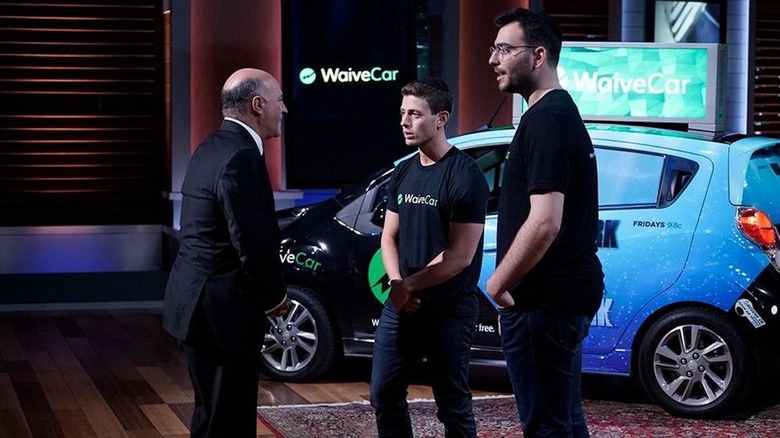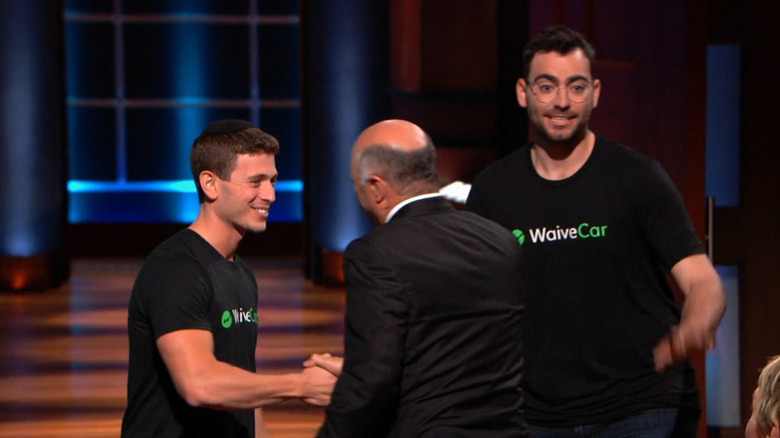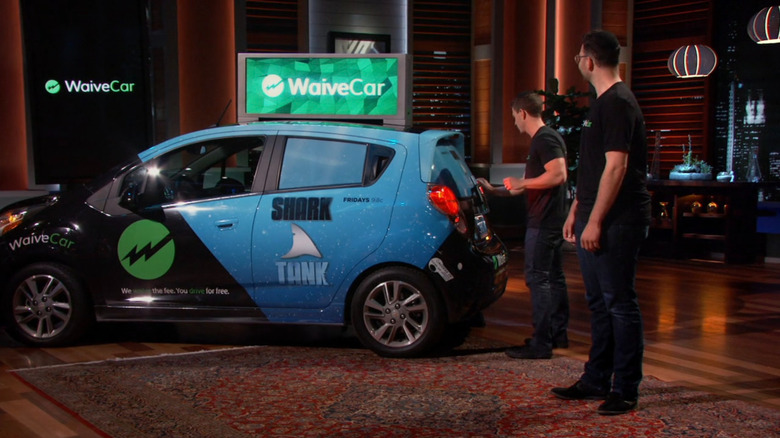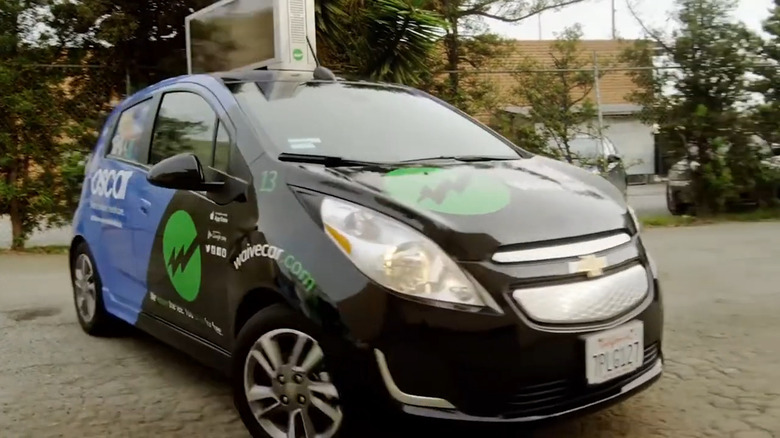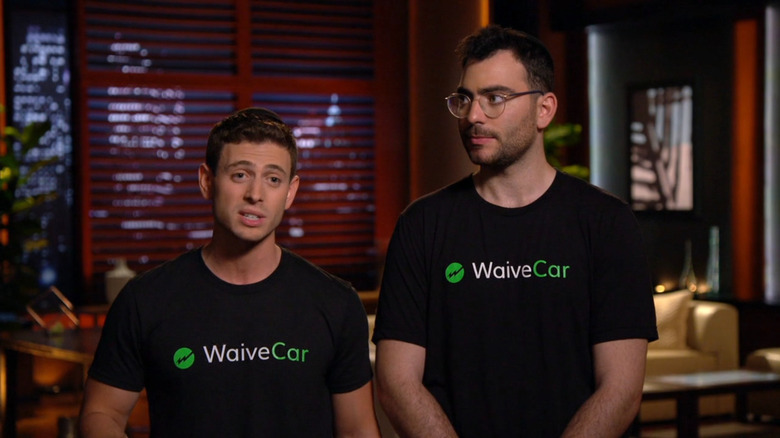What Happened To WaiveCar From Shark Tank Season 9?
The seventh episode of the ninth season of ABC's "Shark Tank" premiered on October 29, 2017, to an audience of 3.18 million people according to Nielsen Media Research's viewership ratings. The first of four pitches featured that week was for WaiveCar, a company providing advertising-subsidized rentals of electric cars. Though the reception among the sharks was very mixed, with a guest shark outright saying the WaiveCar founders were basically drawing up a blueprint for a company like Uber to use to steal their business, they still received two offers, going with one that was less traditional but asked for a lot less equity in line with their initial ask. After the episode was shot, WaiveCar got even more good news: A deal with Hyundai that gifted the start-up 150 cars for a year, with the requirement being that Hyundai was the sole vinyl wrap sponsor of the cars.
Everything seemed like it was going great, and slowly, WaiveCar was expanding into new cities, including New York. However, after an attempted pivot to providing cars for ride-share drivers as WaiveWork, whatever WaiveCar had planned next got decimated by the COVID-19 pandemic. Any hopes of the originally planned level of growth were scuttled, but the company managed a graceful exit, finding a buyer who wanted to try its hand at a similar EV rental business...but that didn't last very long, either. Let's take a detailed look at how exactly the WaiveCar journey went down and what its founders have done since.
What happened to WaiveCar on Shark Tank?
Co-founders Zoli Honig and Isaac Deutsch entered the tank seeking a $500,000 investment for a two percent equity stake in WaiveCar, their business that provided "free" rentals of electric cars subsidized by advertising plastered on the cars. Each car came with a vinyl advertising wrap as well as a "military grade, dual-sided LCD display that [could] display dynamic ad content." The rentals weren't entirely free, though — just the first two hours, with each additional hour costing the customer $5.99.
WaiveCar paid about $1,000 per month per car, but the break-even point per car was $1,500. In five months of operation, WaiveCar had already amassed 4,300 users in its first test market without any advertising. The company had also raised $1.3 million in funding at an $8 million valuation. Asked by guest shark Chris Sacca if they had a particular advantage over potential copycats, the co-founders answered that WaiveCar had an exclusive agreement with the manufacturer of the highly customized, crash-tested displays.
Mark Cuban opted out first, feeling advertising was too volatile and oversaturated. Lori Greiner followed, saying it was too easy to copy, and Sacca joined her, arguing that WaiveCar was doing Uber's R&D for them. Kevin O'Leary was interested, offering a $500,000, 36-month loan at 12 percent interest for four percent equity and control of all unsold ad space, while Barbara Corcoran offered $500,000 for 10 percent equity. After haggling, WaiveCar made a deal with Kevin for two percent equity and an 80 percent ad discount.
What happened to WaiveCar after Shark Tank?
Kevin O'Leary's website has a list of "Shark Tank" investments, and though it's unclear how exhaustive it's supposed to be, WaiveCar isn't on it. However, if you look up his site on the Wayback Machine on The Internet Archive, you can see that the list included WaiveCar before the site was redesigned at some point in 2023 or 2024. This means that yes, the deal closed after the post-filming due diligence process. (Remember, what we see on TV isn't binding.) O'Leary promoted WaiveCar on his Twitter (now X) account a few months after the episode aired, celebrating the doubling of the company's fleet, but that looks like the extent of his public remarks about WaiveCar since the episode aired.
According to an interview that Zoli Honig gave to Pymnts that was published in January 2018, WaiveCar had recently struck a deal with Hyundai that gave WaiveCar access to Hyundai vehicles while making Hyundai the company's exclusive vinyl wrap advertiser for 12 months. "According to industry data, they spend about $230 per person to get people into a dealership for a test drive –- this is doing that for free, and also getting those customers to fill out a survey," Honig explained. "This is a no-brainer for them." That was followed by WaiveCar expanding to New York City in April 2018. There, three WaiveCars were offered for a year as an amenity for tenants in a new building in the trendy Williamsburg neighborhood of Brooklyn.
is WaiveCar still in business?
By all appearances, WaiveCar has been closed for several years. Its social media accounts have long been dormant, with no tweets since October 2019 and a Facebook account that no longer exists. By April 2019, according to a post on WaiveCar's Medium blog, the company had pivoted to offering special deals for Lyft and Uber drivers under the WaiveWork branding, but was promising the impending arrival of something it billed as "WaiveCar 2.0." It doesn't seem like that day ever came, as the WaiveCar website has long been dead, and Wayback Machine caches show that it never pivoted away from WaiveWork.
The best accounting of what happened appears to be in the form of a blog post that Zoli Honig wrote on his personal LinkedIn page in December 2024. Hyundai giving WaiveCar 150 vehicles for free was apparently a huge moment for the company... and then came the pandemic. "But here's the thing I've learned: timing is everything, and there's always an element of luck in any venture," Honig wrote. "WaiveCar was in the wrong industry, in the wrong city, at the wrong time. Thankfully, we were able to pivot and ended up getting acquired by a Softbank backed company called REEF." However, it looks like the REEF Drive brand is also dead, with its website replaced by a "domain available" page and its Instagram dormant since July 2022. It seems like that Instagram account took over the WaiveCar account circa late 2021-early 2022.
What's next for WaiveCar's founders?
According to Zoli Honig and Isaac Deutsch's LinkedIn pages, both of them worked for REEF after WaiveCar was acquired. Deutsch's profile shows him as working under the title of Studio from December 2020 through January 2022, followed by a stint as Head of Real Estate through August 2022, while Honig was VP of Special Projects through March 2023. When the exited REEF, each WaiveCar co-founder launched their own new startup.
For Deutsch, the new business was Stealth Startup. The company's LinkedIn page describes it as "Helping Stealth Startups to Launch, Hire & Scale," adding that "Here Recruiters Usually List Stealth Roles for early stage startups and job seekers can connect and consider those roles." According to the same LinkedIn page, the company is headquartered in Gurgaon, Haryana, India and has a smallish head count of somewhere between 11 and 50 employees. Other information about the company appears to be near-impossible to pin down online, and the company's LinkedIn blog doesn't add enough to make for a clearer picture.
As for Honig, he founded Short Form Media upon exiting REEF. This company, unlike Deutsch's, has its own website, which describes its mission as follows: "Short form media helps executives build their personal brand using our viral short form video system." The idea is that every three months, Short Form provides a director who interviews the executive for four hours, and the company then edits it down into 90 days' worth of short-form video content.
